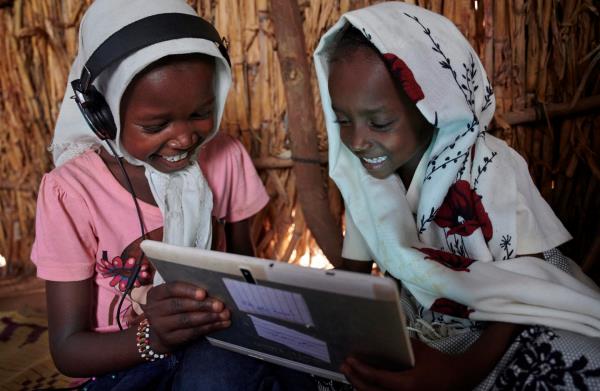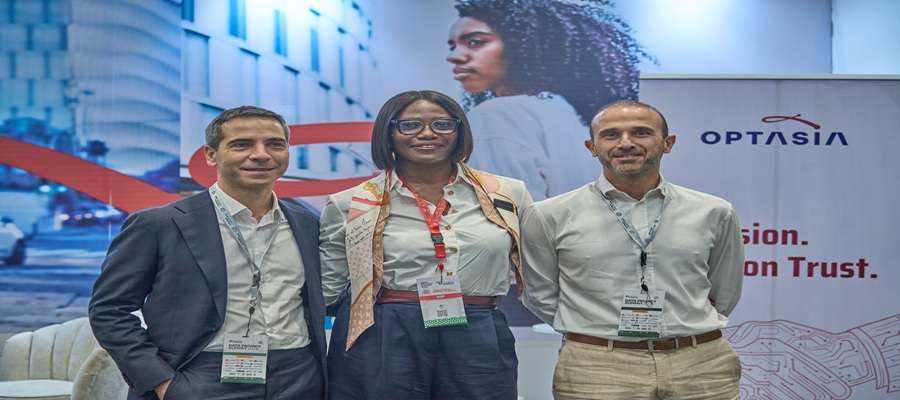Telecom
Ericsson, UNICEF Launch Global Partnership to Map School Internet Connectivity

Ericsson and UNICEF announced today a global partnership to help map school connectivity in 35 countries by the end of 2023. Mapping the internet connectivity landscape for schools and their surrounding communities is a critical first step towards providing every child with access to digital learning opportunities.

Children use their tablet and work with each other at the UNICEF supported Debate e-Learning Centre in a village.
This joint effort is part of the Giga initiative. Launched last year and led by UNICEF and the International Telecommunication Union (ITU), Giga aims to connect every school to the internet. Ericsson is the first private sector partner to make a multimillion-dollar commitment to the initiative and does so as a Global UNICEF Partner for School Connectivity Mapping.
According to the ITU, 360 million young people currently do not have access to the internet. This results in exclusion, fewer resources to learn, and limited opportunities for the most vulnerable children and youth to fulfill their potential. Improved connectivity will increase access to information, opportunity, and choice, enabling generations of school children to take part in shaping their own futures.
“The deepening digital divide is one of the many inequalities that the COVID-19 pandemic has underscored,” said Charlotte Petri Gornitzka, Deputy Executive Director, Partnerships, UNICEF.
“School closures, coupled with limited or non-existent opportunities for remote learning, have upended children’s education worldwide. Our partnership with Ericsson will bring us closer to giving every child and young person access to digital learning opportunities.”
In addition to funding, Ericsson will commit resources for data engineering and data science capacity to accelerate school connectivity mapping. Specifically, Ericsson will assist with the collection, validation, analysis, monitoring and visual representation of real-time school connectivity data.
The data generated through the mapping will enable governments and the private sector to design and deploy digital solutions that enable learning for children and young people. Ericsson will also engage its extensive customer base to further advance the goals of the Giga initiative.
“Ericsson is uniquely positioned to be a key partner in helping address this important issue due to our technology expertise, global scale, decades of experience in public/private partnerships, and proven results connecting students and educators,” said Heather Johnson, Vice President of Sustainability and Corporate Responsibility, Ericsson.
“Working together with partners, like UNICEF and the ITU, amplifies the potential impact of school connectivity and is a concrete first step in helping bridge the digital divide globally.”
“ITU brings a history of technology policy advocacy and regulatory expertise to the vital mission of connecting every school in the world,” said Doreen Bogdan-Martin, Director, ITU Telecommunication Development Bureau. “We are thrilled that Ericsson will join Giga and help build the mapping tools necessary to make connecting every school a reality.”
The UNICEF-Ericsson partnership also contributes to the Generation Unlimited Global Breakthrough on Digital Connectivity that aims to give young people digital skills so they can fully and meaningfully participate in the digital economy.
Generation Unlimited is a global multi-sector partnership to meet the urgent need for expanded education, training and employment opportunities for young people. Additionally, the partnership supports UNICEF’s recent COVID-19 Agenda for Action in which the organization called for global action to keep children learning, thereby requiring the prioritization of internet connectivity in rural and remote areas.
Telecom
MTN Guns for $2.76bn IHS Towers Buyout in African Telecom Power Grab

MTN Group, the continent’s telecom behemoth, has plunged into advanced negotiations to acquire the outstanding 75 percent stake in IHS Towers for a staggering $2.76 billion, a seismic move that would hand Africa’s largest mobile operator full reins over one of the world’s premier independent tower companies and redefine infrastructure control across emerging markets.

MTN
The proposed transaction, pegged to IHS’s latest New York Stock Exchange closing price where it trades alongside a Frankfurt listing, builds on MTN’s existing 25 percent holding forged in a landmark 2014 deal that saw the operator offload most tower assets to IHS in exchange for cash and long-term leases.
Sources close to the talks confirm discussions remain fluid with no binding agreement yet inked, and both sides caution that negotiations could shift or stall entirely—MTN has signalled readiness to pivot to alternative value-unlocking strategies for its stake if a full buyout eludes grasp.
Strategically, the power play catapults MTN toward vertical integration in a sector where operators increasingly crave direct grip on passive infrastructure to slash lease bills, streamline upgrades, and rocket-roll 4G/5G amid Africa’s insatiable data deluge.
IHS Towers, MTN’s anchor tenant across swathes of Africa with tens of thousands of masts from Nigeria’s 13,500 tenancies—renewed amid naira-dollar tussles—to South Africa and beyond the Middle East into Latin America, represents a golden infrastructure war chest primed for the operator’s 20-nation blitz.
The saga traces to 2014’s seismic sale that freed MTN capital for spectrum wars while birthing enduring lease pacts, now ripe for reversal as governance dust-ups over shareholder nominations and agendas underscore the buyout’s boardroom chess.
Market tremors rippled through IHS shares post-leak, underscoring the $2.76 billion tag’s gravity as MTN eyes cost efficiencies, network agility, and expansion muscle in oil-volatile economies where tower mastery spells survival.
Should the ink dry, MTN vaults to ownership of a colossus fuelling digital bridges from Lagos megacities to rural frontiers, slashing third-party dependence while supercharging investments in fibre-deep data dreams and 5G horizons.
Analysts buzz that the mega-deal heralds telecom consolidation waves, with operators reclaiming tower turf to fortify against rivals and unlock synergies in a landscape where infrastructure crowns kings.
Neither MTN nor IHS commented officially by press time, but the high-stakes huddle spotlights Africa’s telecom arena hurtling toward an era where owning the poles decides who dominates the digital skies.
Telecom
Google Calls on Africa’s AI Trailblazers for 10th Startup Accelerator Cohort

Google has flung open applications for its landmark 10th cohort of the Startups Accelerator Africa, doubling down on nearly a decade of continent-wide tech propulsion by targeting Series A pioneers wielding AI and machine learning for scientific and societal moonshots.

The 12-week “AI First” hybrid bootcamp, kicking off April 2026, equips Africa-based or Africa-centric innovators with Google’s AI arsenal, expert mentorship, technical firepower, and investor matchmaking to catapult health and deep-tech ventures into orbit—deadline March 18 at g.co/acceleratorafrica.
“Africa’s tech landscape is seeing a vibrant shift toward deep-tech innovation,” proclaimed Folarin Aiyegbusi, Head of Startup Ecosystem, Africa. “For Class 10, we are focusing on the potential of AI to drive health and societal benefits, providing the infrastructure and expertise to turn these startups into the research labs of the continent.”
Since 2018, the accelerator has turbocharged 180+ startups across 17 nations, unlocking $350 million in funding and 3,700 direct jobs, cementing Google’s role as Africa’s AI innovation forge amid a deluge of homegrown problem-solvers.
Equity-free and hybrid-powered, Class 10 promises Google’s product credits, strategic war rooms, and global networks to forge the next wave of African AI trailblazers reshaping everything from disease detection to climate resilience.
Telecom
Optasia Drives Responsible AI Conversation at Nigeria’s Privacy Week 2026

Optasia, a global AI-driven fintech platform, reinforced its commitment to privacy-by-design and responsible innovation as the official partner of Nigeria’s National Privacy Week 2026.

Optasia
Held at the Transcorp Centre in Abuja, the programme brought together regulators, financial institutions and technology leaders around this year’s theme: “Privacy in the Era of Emerging Technologies: Trust, Ethics & Innovation”.
The National Data Privacy Summit, which concluded on Wednesday, 4 February, was convened in line with the Nigeria Data Protection Act (NDPA), which safeguards personal information across the country.
Welcoming Nigeria’s National Privacy Week 2026, Dr Vincent Olatunji, National Commissioner/CEO of the NDPC, underscored the central role of privacy in building trust and unlocking sustainable digital growth.
“Privacy is not an isolated privilege; it is a fundamental right guaranteed by our Constitution. By building trust, we unlock the full potential of our digital economy and protect every Nigerian’s digital identity,” he said.
These priorities closely align with Optasia’s approach, as the company focuses on enabling inclusive digital financial services while embedding privacy, accountability and trust into its technology and partnerships.
As a company operating AI-powered financial services within highly regulated environments globally, Optasia brings practical experience in embedding governance, accountability and data protection into large-scale digital systems.
The company delivers its services exclusively through licensed financial institutions and regulated distribution partners, supporting the responsible expansion of digital financial services while maintaining robust standards of security and privacy.
Optasia’s SOC 2 Type II certification underscores its commitment to maintaining internationally recognised standards of security, confidentiality, and privacy.
Speaking during the event, Uchenna Agbo, Chief Commercial Officer at Optasia, highlighted the heightened responsibility that accompanies rapid digital growth. “As Nigeria’s digital economy expands, the data that powers innovation and inclusion must be protected with the same seriousness as financial capital,” she said.
“For Optasia, compliance, ethical data use and respect for consumer privacy are foundational to building long-term confidence across the digital ecosystem.”
Optasia’s executive leadership participated in high-level panel discussions, with Chief Technology & Innovation Officer Antoine Chatzistamatiou sharing insights on “Building trust by design: Privacy, ethics, and accountability in emerging technologies”, alongside a senior representative from GTBank.
Additionally, Chief Data & Risk Officer Stelios Lelis contributed to a session titled “Innovation without Intrusion: Balancing data-driven growth with privacy as a fundamental right”, alongside senior leadership from Microsoft and Stanbic IBTC.
Optasia’s Nigeria engagement is anchored in four operating priorities: privacy-by-design, responsible use of AI, innovation without intrusive data practices, and stronger collaboration across the licensed ecosystem.
The company’s engagement in Nigeria reflects a long-term commitment to supporting a trusted and inclusive digital economy. As data-driven services continue to expand across sectors, Optasia remains focused on contributing constructively to ecosystem conversations around privacy, accountability, and responsible innovation.

 News2 days ago
News2 days agoNew Study Reveals How Moniepoint Powers Nigeria’s Downstream Oil Sector with Same-Day Settlements and Working Capital Boost

 E-Business2 days ago
E-Business2 days agoOADC Lagos Reinforces Commitment to Local Data Hosting and Digital Transformation @ NDPC’s National Privacy Week Summit

 Telecom2 days ago
Telecom2 days agoMTN Powers 6,000 Young SMEs with Digital Skills in Economic Backbone Boost

 News2 days ago
News2 days agoFG Mandates Shared Funding for N1.98trn Electricity Subsidy

 News2 days ago
News2 days agoSpain Bars Under-16s from Social Media in Digital Safety Crackdown

 Telecom2 days ago
Telecom2 days agoOnafriq, PAPSS Launch Wallet-Based Payments Pilot from Nigeria to Ghana

 E-Financial2 days ago
E-Financial2 days agoFG Signs MoU with ICAN, CIBN, Others to Train 10m Nigerians in Financial Literacy

 General News2 days ago
General News2 days agoCorporate Comms in the Age of Crypto: Why Nigeria’s Digital Finance Future Depends on Trust



























